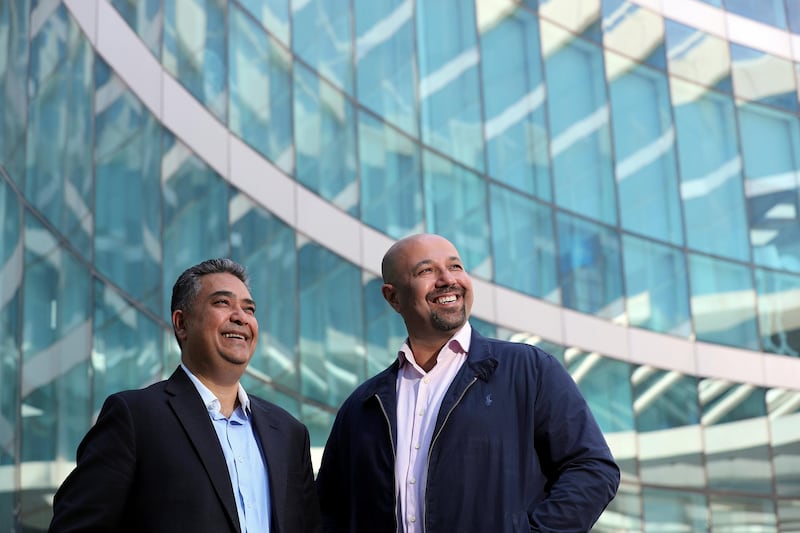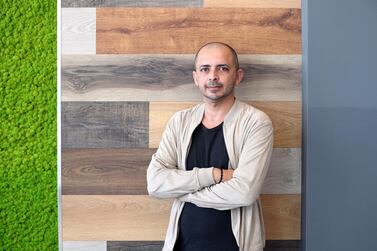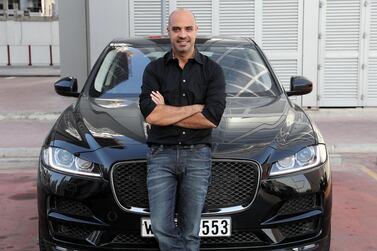Many UAE residents have been in a position where an unexpected turn of events leaves them needing a quick cash boost - whether it's for an emergency trip home, the sudden breakdown of a home appliance or car or even simply running short before the next pay cheque.
A Dubai start-up founded by friends Pishu Ganglani and Ricky Husaini aims to make that situation less fraught with a fast money service anyone can access via the internet, helping reduce the stress a sudden shortage of finance can cause.
"We launched buybackbazaar.com in January 2018 but have been working on this solution for a few years now." says Mr Ganglani. "It was deeply disturbing to see people with genuine needs and good intentions struggle to get emergency funding."
Both men have a lot of experience in finance, meeting first in the 1990s. Mr Husaini, was a currency dealer with a background in investment management who also worked at Manzil, an international, non-profit organisation dedicated to helping individuals with disability. Mr Panglani, meanwhile, had worked as senior consultant at McKinsey & Company and headed the treasury and risk management team for Europe, the Middle East and Africa at Reuters. He also held a senior position at Emirates NBD before leading MetLife’s transformation programme for Asia and EMEA.
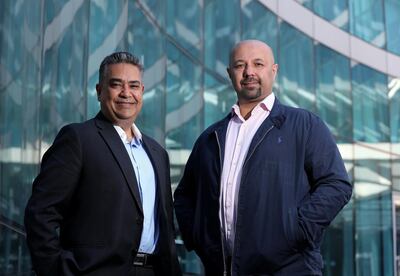
Their first foray into combining their talents and experience in the 1990s resulted in the launch of the world’s first automated platform to carry out forex swaps of the Saudi riyal.
But it was realising that there was an opportunity to provide a service for people in difficulty that spurred them to launch buybackbazaar.com.
"Banks are not able to cater to these people due to their high operating costs and processes," says Mr Ganglani. "Therefore, out of desperation, people seek out alternative sources of short-term borrowing which, in most cases, means predatory fees and charges, some even as high as 400 per year per. As a result, we sadly see people getting into debt spirals they can never get out of."
It is, he says, a critical problem that is growing with global demand for short-term funding now exceeding $4 trillion. "As financial experts with over 25 years of experience, we challenged ourselves to find a solution that would be a win-win for all participants and, more importantly, deliver quick, dignified, hassle-free cash relief to people without ever placing them into deeper debt," Mr Ganglani says.
The pair initially invested "a significant amount" of their own money in developing multiple versions of the buybackbazaar technology platform until they felt they had the right model for our clients. "We only brought in external investors six months later [after launch] after we had done a few hundred deals and knew we had a winning model," Mr Ganglani says. Those backers have significant investment and FinTech experience and Mr Ganglani says they will play an instrumental role in the firm's international expansion plans.
The service works as an exchange platform where licensed shops can offer the best price for second-hand electronics goods, such as a mobile phone, PC or other item, allowing users to convert assets into immediate cash. The seller fills out a short questionnaire online receives a quote on the value of the item and takes that to the store offering the best price on the buyback platform to receive the money. The customer can also buy back the asset subject to a service charge.
However, shops gain further if the customers decides not to buy back the asset, as they can sell it at a higher price than it was bought at.
"We bypass ‘middle-men’ and go directly to retailers who enter their highest price to buy a customer's asset and their lowest profit margin to sell back the asset to the customer," says Mr Ganglani.
As a result, he says, the platform's member shops compete to win customer business, "So our customers always get the best price from our network."
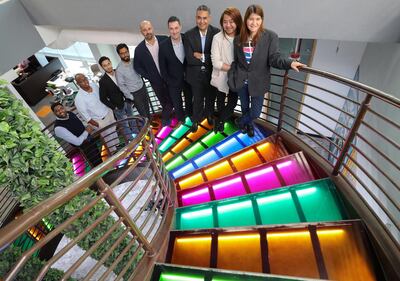
Mr Ganglani points out that the retailers gain from the service, too. "Unlike other online e-commerce sites that take shoppers away from retail stores, we send customers to the shops to be served by them. Shops benefit from the increased customer footfall, leading to more cross-sell and up-sell opportunities," he says.
The most vital aspect of the business, he says, is building trust.
"Customers initially wondered if this service was 'for real' since our rates are so much lower than the alternative," says Mr Ganglani. "They were not sure their assets would be stored safely and if the shops would honour their commitment to sell the asset back to them at the super-low buyback price.
"But once they did their first deal, saw how easy and dignified the process was, and how their assets are stored in secure, tamper-proof packages which remain sealed until they returned, they become converts and think of us immediately the next time they need cash."
While the service might solve a short-term need for cash, it may not help those with long-term debt issues. According to financial comparison site yallacompare's latest Consumer Confidence Tracker, 22 per cent of the 1,200 residents polled said they had more debt in the fourth quarter of 2018 than they did in the same period a year earlier.
However, it appears the majority who turn to buybackbazaar to ease a cash-flow issue aim to repurchase the items they sell.
Mr Ganglani says a third of customers have done four or more deals in the past eight months, while 10 per cent have done more than six deals. "Sixty per cent of our customers have done more than two deals and 87 per cent of our customers return to buy back their item," says Mr Ganglani.
The firm has seen consistent growth with the number of deals increasing by more than 20 per cent per month since launch. "We did more deals in February than the first five months combined," says Mr Ganglani.
"Our primary source of growth is word-of-mouth from our customers besides, of course, the digital and social channels. We have got to nearly 10,000 'Likes' on Facebook and received a special badge from them for having a response time of less than a minute to anyone who reaches out to us during our working hours [the website offers a 'speak to a live agent' feature]."
The network 's current "few dozen" shops are located in Dubai, Abu Dhabi and Sharjah.
However, the company plans to offer fuller coverage to the UAE by the second quarter this year. "We aspire to have an international footprint before the end of the year," adds Mr Ganglani. "We are now fully funded until our next key milestones. We expect to have our next series of funding at the turn of the year."
The entrepreneur says the company aims to be in 10 global cities in the next three years, with plans to also cover a much wider base of assets besides electronics "which people can sell and buy back later such as luxury watches, bikes, cars".
Being in Dubai provides the venture and its founders with the ideal motivation, Mr Ganglani says.
"We have lived in Dubai for the last 25 years. In that time, we have seen this country achieve the impossible and fly in face of conventional thinking. Living in Dubai gives you the sense that absolutely anything is possible, and we are proud to call this amazing city our home."
While he admits there were early doubters of his and Mr Husaini's plan, the duo looked to Sheikh Mohammed bin Rashid, UAE Prime Minister, Vice President and Ruler of Dubai, as a source of inspiration.
Mr Ganglani recounts a quote that spurred the pair on: “'In the race for excellence, there is no finishing line,' Sheikh Mohammed said. And we are hurtling down this path on a mission."
Regarding words of wisdom of his own, he adds: "Fail fast, iterate quickly and know when it's time to stop planning and start driving."
Q&A: Pishu Ganglani
What would be your top three guiding principles for today's entrepreneurs?
Test-drive your idea on a small base before you create frameworks around you (website/licensing/employee hiring, etc)
Have financial protection for yourself in place as a founder before you embark on the journey. One of the top five reasons start-ups fail is the founder burns out. Then look after company financials.
Spend time identifying the 'idea' and see how your own skill-set matches with what you need to do. Ideally stay within your own comfort zone when it comes to starting a business
How can entrepreneurs overcome the risk of failure?
Be open to senior people you trust being the devil’s advocate - constructive criticism is invaluable.
Have a co-founder - the journey does not have to be alone. And complimentary skill sets, as well as relationships that two people bring to the table raise the odds of the business succeeding.
Get access to meaningful, high-quality mentoring and give a token percentage equity stake in exchange. Then you can expect much more than just the lip service that someone will give in a 15-minute chat at an accelerator get-together. [Get] quality time spent on an ongoing basis to help tweak the business or identify things which the entrepreneur doesn’t focus on because he or she is so ‘involved’. Lastly, tangible 'door-opening' from the mentor helps grow the business. You can also leverage your mentors for getting access to finance.
If you could turn back the clock and change something from history, what would that be?
We want to turn the clock forward - no looking back!
Is human capital an issue in the Middle East?
No. As long as anyone has the right attitude and intelligence, they can learn to pretty much do most of the jobs out there. So, the onus is on 'management capital' really to make that happen. The issue in the Middle East is depth and breadth of transformational leadership, not middle and lower management human capital.
What is the biggest challenge for Middle East entrepreneurs?
The biggest challenge was paucity of frameworks which incubate and develop the start-up ecosystem. This has been rapidly changing with the number of hives and accelerators we have seen in the past year. Also, government support has recently ramped up in many places.
Access to capital in less-developed countries of the region is still a challenge and this is where your seed investors play the greatest role. We were adamant at the start to focus on bringing in ‘intelligent capital’ rather than just family and friends.
Linked to the fund-raising effort is the understanding of valuations and the linkage between company performance and valuations, which is a far more developed subject in many other countries. Middle East investors are still more comfortable with brick-and-mortar models with clear profit numbers as clear signposts to success.
